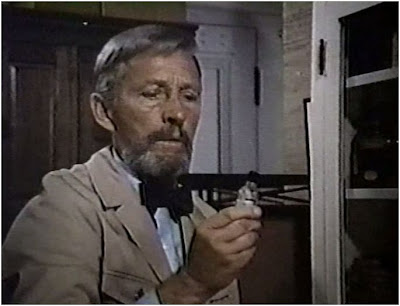By many accounts, Bing Crosby was a bit of a prick. According to half his kids, he was an abusive father, both physically and emotionally; to the other half, he was an adoring father and the living embodiment of Father Chuck O’Malley, his iconic character from Going My Way and The Belles of Saint Mary’s. A recovered alcoholic, devout pot enthusiast, former part-owner of the Pittsburgh Pirates, Crosby had many facets beyond crooner and “that guy in those road movies with that other guy”. Depending on who you talk to, or which ever-reliable Internet source you visit, Crosby’s last performance was either as himself in That’s Entertainment in 1974 or a brief and uncredited cameo in the Bob Hope vehicle, Cancel My Reservation in 1972. But do some original research and you’ll uncover the news that his last major role in a feature film was in a TV-movie in 1971, Dr. Cook’s Garden.
The movie was an adaptation of a disastrous Ira Levin (Rosemary’s Baby) Broadway play, directed by George C. Scott and starring Burl Ives. Seen as superficial, standard and convoluted without being interesting, the show closed after less than a week. Fingers were pointed. People fought. Lives and civilizations were ruined.
Of course, ABC thought it would make a terrific movie. Adapted by Art Wallace and directed by Ted Post, Dr. Cook’s Garden was tailored for the eternal, fatherly Crosby. The titular Dr. Leonard Cook is a kindly doctor in small-town Greenfield, an idyllic paradise that he had a hand in creating. Everyone is happy, healthy, free of crime, litter, hooligans, any and all minorities… The good doctor loves his patients, his town and, especially, his beautiful garden, right outside of his home office, which he tends to lovingly every day.
Hometown boy Dr. Jimmy Tennyson (Frank Converse) returns and becomes Dr. Cook’s assistant. After about nine minutes in his mentor’s presence he begins to notice something peculiar. Some—not all, mind you—of Dr. Cook’s patients start to, well, die. Of little things like colds and dandruff. But all of these former patients are the usual horrible little monsters of small townery: the alcolholics, the abusive husbands, guys with bad tempers who kick dogs (really). So when they die, the rest of the town goes “Enh” and returns to their normal activities of porch-sitting.
So it would seem that the good doctor is playing god (which brings to mind Dr. Hfuhruhurr in The Man With Two Brains, when he replied, “Somebody has to!”) But, like all men of conscience, Tennyson can’t abide by such a breach of the Hippocratic Oath, no matter how mildly-annoying these dead people are. Increasing his tension is the fact that his girlfriend, Janey, is played by Blythe Danner, and that can’t be healthy for anyone.
Originally broadcast as an ABC Movie of the Week in 1971, Dr. Cook’s Garden has been seen only rarely since. It wasn’t rebroadcast after its initial airing and it was many years before it showed up on late-night cable. It’s also mysteriously absent from Bing’s Wikipedia page and numerous biographies. Which is odd. Despite the turgid pace (particularly for a movie lasting barely over an hour) and one of the most beloved actors appearing as a serial killer, there’s little offensive about the movie. Quite the opposite, as the central message is quite intriguing.
What horrifies Jimmy is the central moral argument. Unlike the late Dr. Jack Kevorkian, Bing’s Dr. Cook isn’t helping his patients to die so much as choosing who gets to live. As he sees it, it’s his moral duty to the potential utopia of the town. His decisions of who to “put to sleep” are never rash, but are considered with great care. Where Jimmy disconnects is at the idea of how far will Dr. Cook go to keep Greenfield so idyllic. What if the kindly madman decides that litterbugs are the next line of offense? Or people who speak loudly at the movies? (Which, of course, most people would support 100%, but that’s hardly a moral choice as much as justifiable homicide.)
It’s this central theme that over-rides Post’s sluggish directing. There’s zero suspense nor even the attempt of casting doubt’s shadow over Dr. Cook’s complicity in the sudden deaths. After Cook suffers a brief cardiac episode minutes following the opening credits, anyone who has ever seen a movie before will anticipate the ending. It all leads up to the young doctor placed in his mentor’s position.
Predictable, sure, but still effective as far as discussion topics go. In the end, it’s the film’s rarity, the bizarro casting, and an excellent glimpse into Crosby’s dark side that make this movie worth hunting down.
Good luck with that. (Okay, the whole darned thing is on YouTube.)
For an even better analysis of Dr. Cook’s Garden, may I refer you to Amanda Reyes’ excellent essay here.



I found this on dvd at these sites if anyone is interested. Thanks
ReplyDeletewww.dvdsentertainmentonline.com/product/dr-cooks-garden-dvd-tv-bing-crosby-blythe-danner-1970
www.vendio.com/stores/OldTimeMoviesandTV/item/dr-cook-s-garden-dvd-tv-bing-c/lid=20029951
My mother and brother had a non-speaking part in this film. They walked by the camera apparently on their way to an appointment with the doctor. My dad would always joke that he turned to sneeze and missed it.
ReplyDelete